|
3.5 stars
When the Moon Hatched was equally interesting and unwieldy. It was a very cool world concept and an interesting premise, but the story fell apart under the author’s meandering scene structures and overwritten length. However, I did enjoy the raw hunk of narrative within the mess, so….? It’s one of those series that I think will improve with later installments. Concept: ★★★★★ Pacing: ★ 1/2 Action vs. filler scenes: ★★ 1/2 World building: ★★★★ This is a reaction review, please see the book's description for the blurb. When the Moon Hatched is one of those independently published novels that got picked up by a traditional publisher because of the grassroots marketing and hype. I'm not trying to knock it or call it out for this reason, but for those who are not plugged in to the publishing world updates and/or read this review after 2024 when the hype dies down, I think it is relevant information to have. I have mixed feelings about independently published books. On the one hand, I LOVE THEM. It's a way for authors to publish books without the red tape, and it often leads to more freedoms and control for marginalized authors who can't get through the maze of the uptight publishing machine. It also leads to some really, really great books. But on the other hand... traditionally published books are vetted like nobody's business. They're ruthlessly edited for length, consistency, pacing, and more. They're shaped into final products, and there is (usually) a quality control element that ensures that the book you pick up in the store is going to work out for you on a mechanical level, if not an enjoyment level due to optional factors like tastes, writer's voice, and actual plot contents. I unfortunately do not think that When the Moon Hatched is a final product like those traditionally published novels or some of my favorite independently published authors. It has such a cool world: There's dragons in it, but dragon's aren't the be-all, end-all of the world building (something that tends to be the easy hook for other dragon books). Everyone is fae, with all the usual tropes that entails PLUS a fun elemental magic element that is truly unique involving the elemental gods. The customs, phrasings, and set up of this world is SO intriguing and immersive that I found myself immediately wishing for more fanart and spin-offs to the concept—it's a rich enough world to sustain that. It also has a pretty decent hook: Raeve, our female protagonist, is an assassin-for-hire in the rebel underground who has deep secrets and a revenge vendetta that fuels her motivations—and she's about to find herself in the middle of a huge quest plot involving a hot dude. Yes, it's been done by many of the titans of romantasy and fantasy, but it's a solid hook and I like reading that kind of story. So where did When the Moon Hatched fall apart?? Easy answer: the meandering length. This whopper 700+ page tome did not have enough raw plot/action to cover that kind of page count, so what could have been an unputdownable 400-500 page experience became a slog involving multiple sessions of "sigh, let me try to get through more of this today" energy that felt unfulfilling due to the sheer amount of filler content and repetitive scene structures in the novel. Too many scenes with Raeve being the "mentally traumatized yet outwardly tough assassin who can't trust anyone" mixed with Kaan, the male love interest w/ harsh kindness and unbelievable magical strength who clearly knows more than Raeve and yet doesn't tell her the facts. (Such an annoying dichotomy that only carries you for the first few hundred pages before you lose all patience with the concept and just want the truth already so that the real plot can progress). I was tolerant of this trope for the first 400 pages because a) it's in a lot of these stories and I don't mind it when it's done well and b) there was so much going on / getting explored in the world and plot that it wasn't a plot crutch, it was just waiting for its turn. That patience dissolved with prejudice when, in the second half of the novel, we sat in this loop of nonsense—repeated types of actions, repeated interactions with characters, odd side quests, barely fleshed out introductions of new POVs after an already established 2-POV structure—where the delays to information served...no real purpose. The weight of the payoff collapsed, and I was left frustrated, angry, and bored. Never a good combo for a reader! HOWEVER, all that griping and negativity aside, I thought this tale had that extra "something" to it that makes for a good story. I think, with editing, this series could really turn into something epic. I am looking forward to the sequel and will definitely revisit this world again.
0 Comments
4 stars
The fae are fickle, wicked things—and the worst thing a human can do in their presence is be interesting... Pacing: ★★★★★ Characters: ★★★ 1/2 Sense of mystery: ★★★★ Romance: ★★★ 1/2 Tropes: why choose, male/female pairing, unreliable narrator, multiple love interests, faeries, deadly game/competition, primal(ish), morally grey, enemies-to-lovers, slowwww burn, unresolved mysteries in first book. As a Holly Black, Melissa Marr, and OG faerie reader, I like my fae the old way. I want them to be unable to lie but viciously able to talk circles around their truths. I want them to be inhumanly powerful and jaded by their long lives to the point where normal moralities have left them. I want them to have personalities and jawlines sharp enough to cut a knife. I want them to feel undomesticated and wild, like a predator that you know you shouldn't bring inside your home. (I don't think these things are too much to ask.) Wilde Fae delivers on THOSE kind of fae. And I was so here for it. There are no wings here, no shadow daddies, no "I'm big and tough but yet still somehow super empathetic". (There's nothing wrong with those traits, I hold them as my precious in their time and place.) The fae men of this novel are actually dangerous, they do not care if you make it to the end of the night, and the only thing that truly terrifies them is boredom. So for our main character, Lonnie, the true terror she deals with is this: she's interesting. Lonnie is interesting to the fae every day, due to some odd spark in her aura that she's terrified to acknowledge. Being interesting is already bad enough—but when one fateful night leads to a shocking outcome, Lonnie finds herself in a whole new realm of unwelcome fae attention. Specifically, the attention of the ruling fae family: the Everlast. And it's a toss up on whether she's going to survive to the end. The wicked brothers of the Everlast family all have different reasons to hate Lonnie. But due to the bindings of their house and the situation Lonnie finds herself in, they can't end her... yet. Keep your friends close, but keep your enemies closer... Clearly, I loved this novel and had a lot of fun reading. Here are some specific, non-spoiler reasons why: - The slowest of slow burns. It's rare to have a fae-based romantasy where the characters build their tension in a realistic time frame. I loved that this novel didn't speed things up to fit anything into this first book in the series. - The unresolved mysteries. The fae and Lonnie are all holding their own secrets, and again, in a unique turn of events this novel does not reveal any of them. I'm hooked on the unknown, and I'm thrilled that these questions are propelling us into the second book without a ton of hasty reveals. - Not bogging the reader down with dense descriptions. I'll repeat, I'm a fan of Holly Black. Which means I'm a fan of a story that is plot first, dialogue second, and descriptions third. I can set the scene myself with the colors of the room and the outfits and the set decor and etc.—give me the action elements, as that's what I want. This novel danced that line perfectly. - And again, for the people in the back, the depictions of the fae. I enjoyed the commitment to their fickle, vicious natures. Lonnie's never actually safe, which makes sense due to the setup. But there are enough crumbs there for a us romance girlies that keeps this story from being a dark/grim romance. This is NOT a non-con/dub-con scenario, it's just a morally grey setup with some dangerous players. 3 stars
This was…bizarre. More bizarre than I was expecting even given the screwball pitch. But it was fun? Concept: ★★★★★ Pacing: ★★ Actual plot: ★★ Humor/Shenanigans: ★★★★ Sometimes, you read a book for the vibes. Assistant to the Villain is that book. Evie Sage needs a job. Her father is ill, her sister is young, and they have no money. So when she encounters The Villain—the land's most notorious criminal and murderer!!—in the woods on the run from the king's guard, Evie finds herself in the bizarre position of accepting The Villain's offer of employment. Evie handled herself well in the crisis of escape, and The Villain wants her to handle his office. It turns out Evie is the perfect personal assistant to The Villain. From office drama to document filing disasters, Evie has The Villain's lair in tip-top shape. Her drama with the office manager, dastardly Becky, is a prick in her side, but Evie won't let that get to her. She is a professional. (Even when the severed heads of The Villain's enemies drip blood on her when she's trying to get to her desk.) The Villain has no idea how he came to have Evie in his employ. She's fearless, she's clumsier than any human ought to be and make it alive to adulthood, and she's determined to succeed in her profession. (The Villain refuses to acknowledge that he would do a great many things to keep Evie's mood happy and content. Her smile and twinkling personality do absolutely nothing to the odd flutter in his stomach when she's nearby.) But like all evil overlords, The Villain has those who wish him dead. And as a plot to end his reign of terror unfolds, Evie and The Villain find themselves trying to find a hidden culprit before its too late... My thoughts: From that pitch, you know this is an odd satirical tale. It's like The Office mixed with medieval villainy, and it's a screwball pitch on a good day. Mix in a dash of romantic drama, some very iconic yet limited side characters, and you've got quite a narrative setup. And I'll be honest... it was fun. Was it my favorite though? No. This concept was fantastic, and the author clearly has a talent for the odd mix of Monty Python energy mixed with grounded plot. But in full transparency, this book was a lot. It was both easy to put down and very exhausting to try to read in large chunks. With a lot of sameness in the humor and some interesting turns in the plot that lost me rather than gripped me, Assistant to the Villain was a book that I found myself enjoying but not loving. I also assumed this novel was a standalone, but it VERY clearly is not. So be warned for an unresolved ending that apparently has two more books... However, all that being said, I am intrigued enough to continue and see where the author takes us. 4.5 stars
It's a rare thing to find a high fantasy that takes a familiar playbook and shakes something fresh out of the dust. This one does it, and she does it WELL. Don't sleep on this indie fantasy series. World building: ★★★★ Plot/Pacing: ★★★★★ Characters: ★★★★★ Enjoyment: ★★★★★ When you start Daughter of No Worlds, you're likely going to think about its similarity to a few very popular fantasy and young adult fantasy popular works. That's okay, because this novel does start in a somewhat familiar setting: it's a girl in a world against her, with some unique traits that make her a target who starts at the bottom of the ladder in an oppressed way—and she's going to do something about it. That's a template that we know. Especially when it is paired with the older male, world-weary yet powerful, who finds himself drawn into the young woman's powerful, world-shaping energy. But once you move beyond that surface-level introduction, Daughter of No Worlds begins to shine from the deep and grow with intensity with each reveal and new element. This author is playing the long game, and the further you dive in, the prettier the pearls. A formerly enslaved woman with a need to succeed. A former warrior captain with scars and a weary acceptance of power corrupts. A world on the brink of war. A change in the air. Enter the world of Daughter of No Worlds. I promise you won't be disappointed, and I promise that the bland blurb that you read—which, yes, I agree is like many a blurb for many a romance fantasy--is hiding some really cool and very unique things. Tisaanah is a female protagonist that I understood on a deep level. She's not the best at everything, but she doesn't have to work for everything overly hard either. Her passion is deep but her capacity for brute force and single-minded focus allows her to make the difficult calls when others would balk. She's aware of her place in the world, and she's aware that everything between her and her goal is a fight that she needs to strategize to win. Max is a male love interest/mentor figure who REALLY surprised me. He is no Rowan Whitethorn with his past battles and trauma. (I am the biggest Rowan stan, so let's not slander my man here either, Rowan is great and has his place.) Max is a soft boy with hard edges, less than 10 years older than our protagonist, and he'd rather garden all afternoon than train Tisaanah in the art of magic and power plays—until, of course, push comes to shove and his claws come out. His arc was one of the freshest I've read for this kind of fantasy and I loved that. And there's a third intriguing character here that stands apart from our two mains and slightly off from our side characters... I won't spill the secret, but let's just say that element took me COMPLETELY by surprise and immediately catapulted this series into another unique level for me. This is where the series deviates dramatically from others you've read before and cracks open into something fresh. I can't wait to see how this all plays out in the trilogy. Time for book two! 4.5 stars
This was an addictive read--fun and flashy, yet still a normal "competition" fantasy romance...until it surprised me and ripped open into something devastating and shiny. Then it became a new favorite. Setting: ★★★ Plot/Pacing: ★★★★★ Characters: ★★★★ Enjoyment: ★★★★★ Before we begin, a rambled note on TikTok: In my opinon, TikTok is an odd zone for the book community. It's large, obviously, and a lot of people love it. I love that for them. But overall... I struggle. I almost never agree with the flashy/quick recommendation videos based on hype and aesthetics vs. actual similarities between books. I think they're formed on the fly in the hype culture of fast recs vs. quality recs, and I also think it's often the same books in the rec pot across the board. (This isn't a TikTok specific hate, I've always grumbled about Instagram and YouTube too when it comes to "if you like this, try this" content.) So usually, I avoid all TT recommendations like the plague until someone I trust and/or actually know takes a bite of the apple. In a totally unexpected and surprising turn of events, Amy read a TikTok-recommended fantasy romance. (Did you hear that? It was the reality paradigm, it cracked in half when I typed that sentence.) No, seriously, it's true. This ridiculous anti-platform gremlin/stick-in-the-mud reader picked up The Serpent and the Wings of Night because it refused to leave her alone, and there was something deep down that made her go... maybe they're right, maybe this is awesome. And it WAS. Imagine if you took everything you liked and stirred it into one pot. For me, it's a combination of the following ingredients (let's make a potion together): -A deadly game, competition, or high-stakes survival scenario -A female protagonist with *actual* hard edges/reasons to be a badass -A male love interest who has more character traits than 1) I Am Powerful/Deadly/The Black Sheep, and 2) Relentlessly Attracted to FMC" (it's amazing how many SFF men fail this test—even some of my favs.) -A unique world, bonus points for a clever twist of the usual tropes -A sense of actual doom/high stakes/death impending -Realistic fighting -Actually consequences/death -A well-done, slower-burn romantic pacing -Decent dialogue for the steamy scenes -Great writing all around -More than 1 side character with a backstory and personality And that's it. I'm a simple girl, with simple needs.... and a longgg laundry list of things that need to hit right for me to love the fantasy romances. I usually love books that include at least two thirds of my list—it's not like I sit there with my checklist, but anecdotally, I've noticed I tend to follow this list subconsciously in my book selections. The Serpent and the Wings of Night hit every. single. one. I read this book in ONE DAY and then read all of book two two days after that. Don't sleep on this one, fellow fantasy fans and those who like those things on my checklist. This book has it all. 5 stars
Yarros had the AUDACITY to put all of my favorite things in one book?? *fans self* Dragons, fights to the death, enemies to lovers, and a perfectly accessible writing style have made this an addictive series to watch. Plot/Pacing: ★★★★★ Characters: ★★★ Setting: ★★★★ Enjoyment: ★★★★★ This book really said, "Let's combine everything that worked in a bunch of fantasy books before and mash them into something awesome." And it worked. Fourth Wing has been all over the book community this spring. If you've somehow not heard of it yet, you will, and if you haven't broken under the hype train and tried this story out, then you are an insanely strong personality and I fear you. I had no desire to avoid this hype train—I've been eagerly awaiting it since this book popped up on my Amazon "you might be interested in..." window in late 2022. Dragon riders. A college segmented into quadrants. A quashed rebellion with lingering consequences. A longstanding war. Magic powers. A girl caught in the middle, tugged on by Fate. I know, I know. We've heard those things before, right? That's like Eragon + Divergent + Deadly Education + Red Queen + [insert blockbuster series here]. But Y'ALL. When I tell you that I couldn't put this book DOWN, I mean that I literally took it into the bathroom with me so that I could keep reading it. (Outing myself here, but you need to hear me right when I talk about this level of obsession.) I ignored texts for this book. I ignored meal times. Like I've already said, I took this book with me for calls of nature. Fourth Wing couldn't be stopped, and I was obsessed beyond reason. Addictive is the only word I can use to describe this reading experience and the subsequent fandom hype that happens after you finish. Unlike some popular reads out there—where let's be honest, once you gain some distance you realize flaws and your passion fades—I don't see this happening with Fourth Wing. I'm days out from my first read and I'm still wishing I could dive back into this world. This is so clearly a reaction review that I don't think I want to talk about anything specific in this story. The blurb pretty much covers it. My only caveat for Fourth Wing is related to its fanfiction-like status as a remix of the greatest trope hits: Listen, I know this book isn't a unique snowflake. But I literally don't care. There's something to be said for the talent required in taking an established set of ingredients and still baking something tasty that feels like a handmade treat tailored to you, you know? Ride the wave, y'all. It's so much fun. Thanks to the author for my copy in exchange for an honest review. 4 stars
What a cool, demonic sapphic noir! C.L. Polk always knows how to write the most intriguing worlds and yet keep them accessible to the casual speculative reader. Concept: ★★★★★ Characters: ★★★★ Plot/Pacing: ★★★★ First off, I must say that the Tordotcom publishing house has become unstoppable with their cover design and title choices recently. This cover + this title? It was screaming to be read. Helena Brandt is a magical woman living in Chicago in the mid-1900s. In this alternate-yet-similar America, magic and demons are all too real. And there are "good" magic users and "bad" magic users. Ten guesses as to what side Helena's been labeled... Yep, you were right: a "bad" magic user, or warlock in this world. Helena made one life-altering decision nearly 10 years ago, and the Brotherhood of good magicians cast her out for her sins. Ever since that fateful day, Helena's turned to a life of magical detective work and crime photography. But life isn't all roses and daisies for a female detective in 1940s Chicago. Especially for a queer one who doesn't stay in her lane. With enemies closing in, the law a constant threat, and an internal clock ticking ominously down to a very final end, the LAST thing Helena needs is to encounter the worst case of her detective career. She'd walk away from that job in a hot minute, but her boss offers her a deal that she just can't refuse... And now it's up to Helena to catch a killer before the deadly trap closes around her. Even Though I Knew the End was C.L. Polk at their finest. Complicated concepts done simply with accessible character development and dialogue. A fantastical world with the codes and dark sides of our real-world reality. And some very intriguing twists that feel simple and predictable...until they're not. I recommend this novella to anyone who enjoys historical noir, queer stories, demonic thrillers, and perfectly packaged short fiction. This was a fun ride! 3 stars
Intriguing concept. This entire first book felt like it could have easily been a condensed prologue instead of a drawn-out novel…. But I am seeing the glimmer of a cool plot here for the later books in the series. Concept: ★★★★ Plot/Pacing: ★ Characters: ★★ Disclaimer: This is a reaction review. If you are interested in the book's plot, please see the book description! As someone with a pulse and access to the online book community over the past few years, I'd heard of this book. It's hard to be in this community and somehow avoid seeing the Plated Prisoner series somewhere. For a while there, it felt like it have the ubiquitous staying power of Sarah J Maas—it was everywhere! I went from interest, to zero interest, to extreme interest over the years. Fantasy romance with a lot of TikTok hype? I don't know... It's about King Midas and involves toxic relationship vibes and trigger warnings? Absolutely zero interest. But wait, it's actually got [soft spoiler] in there and involves some strong character redirections? Okay, never mind, sign me up. It's been a journey. So I finally sat down and picked it up! Gild is one of those books that I feel like I will never read again. Let me explain. Similarly to Maas' Throne of Glass novel (as in, the actual first book in the series and not the series itself), there are some introductory books out there that exist as barely-there prologues that are necessary evils for "first books" and then are immediately improved upon with later books in the series. Sometimes SO dramatically improved, that when you pick up the series later for a reread you don't even bother with that dull first book. (While I reread Throne of Glass as a series every year, I never actually go back to book one, I skip right to book 3 and onward.) This was a similar reading experience. Gild had a really cool hook: Auren, a woman with literal gold skin/body parts, is kept in a gilded cage by King Midas. It's a toxic, well-worn love between Midas and Auren involving her pining for him and excusing his toxicity and Midas keeping her as his ultimate prize and allowing Auren just enough affection that she stays docile. As the Midas mythos goes, this was a very unique place to start. And it had enough world building to really intrigue me as a reader. But then... this novel stalled out for me in a major way. Auren's situation is the definition of two-dimensionally flat. She's essentially an enslaved sexual object in this scenario, and she both acknowledges that fact and simultaneously thinks she's more than that. And for the entirety of this novel-- MILD SPOILERS, STOP HERE IF VAGUE SPOILERS BOTHER YOU —every single interaction between Auren and any male character was stripped down to this. She's lusted upon, constantly threatened with sexual assault, and then occasionally treated nicely for the purposes of showing the reader why Auren hasn't completely revolted in her cage by now. This dichotomy of an abusive relationship between Auren vs. Everyone was seemingly endless and, after a point, useless as a plot device. And, problematic reliance on sexual assault as a plot device and lack of conversations around enslaved sex workers aside, this led to an extremely uninteresting and depressing narrative. I kept questioning why people enjoyed this series if this was all there was. Regardless of your opinions on dark topics in your fiction, this wasn't a well-told story! But I kept going, because I'd been softly spoiled for some of the later elements in the books and I wondered if this series would follow another of Maas' books, A Court of Thorns and Roses, with its unique bait-and-switch structure to that series. Let's just say that things got much more interesting in the last 10% of this story. So interesting, in fact, that I downloaded the second book IMMEDIATELY and thought to myself, "here we go, finally" and got to reading. More POVs, a new character has arrived, and the chess board has changed... I'm ready for the real plot. Let's go! NOTE: Not recommended for sensitive readers. Trigger warnings for sexual assault, graphic sexual situations with murky consent, toxic relationships, emotionally abusive relationships, death, internalized mental health struggles. 2.5 stars
I went to from super hyped about this concept last year...to a lukewarm reading experience....and then a few days later to the realization that—despite my love for Roshani Chokshi—I just did not like this at all. I think this has a certain readership, and I'm sad I'm not one of them. Concept: ★★★★ Sense of uniqueness: ★★ Investment into the characters: ★ Once upon a time, a man who believed in fairy tales married a beautiful, mysterious woman named Indigo Maxwell-Casteñada. He was a scholar of myths. She was heiress to a fortune. They exchanged gifts and stories and believed they would live happily ever after—and in exchange for her love, Indigo extracted a promise: that her bridegroom would never pry into her past. Indigo is the beautiful and enigmatic muse woman of everyone's dreams. She's too flawless, clearly a bit dangerous, and so beautiful that you can't look away. The Bridegroom certainly can't. He loves his wife more than life itself and is willing to follow her into the dark. One day, Indigo receives a message that her aunt is dying in her childhood home, the House of Dreams. Taking her bridegroom with her—this man is never named, so apologies for using "bridegroom" over and over again, it's a part of the dream-style repetition in this novel—they arrive at the surreal and darkly Other house. It's while we're exploring this elaborate house filled with the echoes of secrets that we meet our second POV: Azur. Azur's timeline is during Indigo's childhood, and she was Indigo's everything. A childhood spent surrounded by magic and twin ties and secrets and oaths, Azur and Indigo were two sides of the same coin. It was going to be Indigo and Azur, forever and ever. But there's no Azur here with Indigo and the bridegroom. As the bridegroom explores the House of Dreams, Azur's tale unfolds in the chapters in between. The House of Dreams has witnessed a lot of secrets, and it has some secrets of its own. Will the bridegroom be able to keep his promise? Or will he look back into the dark and find out the truth about Indigo's past? Alright. So I'm not going to dissect the plot or anything here. I think this is a story that is intentionally like a fable, and more importantly, intentionally like the echoes of a story arc that some of us readers have likely read before. It's also a story that cares more for its ominous atmosphere and sense of lyrical flow than its concrete plot. There's nothing wrong with any of that. But I will say that I wish this book had brought some more things to the table. For how drawn out it felt, for the amount of actual plot that happened in its pages, I needed more as a reader. I wanted something surprising, I wanted this very familiar arc to bring something fresh as a payoff for its very slow pacing. I needed to feel closer to these characters that felt, emotionally, like they were separated from me by layers and layers of glass. I just needed... more. So, if you're like me and the above items bother you, I'd skip this one. But if you like the concept and don't mind that kind of thing, I do still recommend this one. 5 stars
Books like these are why I adore fantasy with all of my heart. A pirate queen cajoled out of retirement for one last payout. A deadly sea with supernatural consequences. And a myth in the making. Concept: ★★★★ Characters: ★★★★★ Narrative voice: ★★★★★ Enjoyment: ★★★★★ The Adventures of Amina Al-Sarafi reads like one of those great myths that creep up on your slowly. As your parents, schoolmates, books, and media tell it to you—it's almost like it's always been there, a fictional story existing outside of your own lived existence and yet wholly real somehow, grounded in historical fact and cultural relevancy. To put it even more simply: Mention the concept of "greek gods" to almost anyone on the street these days and they have the story already. They know the strokes, or they know at least several small details that have made it into their brain via cultural osmosis. When I read Amina's tale for the first time, I felt that stirring. That behemoth feeling in the deep that this is a tale that's more real than fiction, more muchness than just a fable told to mimic the 1100s Indian Ocean tales for a 2020s audience. Like the best fantasy tales of new and old—Amina Al-Sarafi is here now, and she's always been here and always will be here. Her tale is too rich to ignore. Combining elements of seafaring adventure, heists, monsters, and more, The Adventures of Amina Al-Sarafi struck me most in its unique and unputdownable voice. Amina's no-nonsense, middle-aged motherhood persona was a treat in its (unfortunate) uniqueness in today's fantasy market and also a hilarious narrator in her endless dry wit and "let me tell you how bad things went to shit" attitude. There is nothing I did not like about this story. It stands proudly in the canon besides Chakraborty's already titanic City of Brass trilogy, and other fantasy legacies such as R.F. Kuang, Fonda Lee, Jacqueline Carey, Jenn Lyons, and more. Oh, and there's the swashbuckling, seafaring, mythologically induced adventures with all of the plot points you could possibly want rolled into the most attractive package to any fantasy fan. I enjoyed the hell out of myself. I think others will too. |
Amy Imogene ReadsJust someone looking for her own door into Wonderland. Categories
All
Archives
July 2024
|

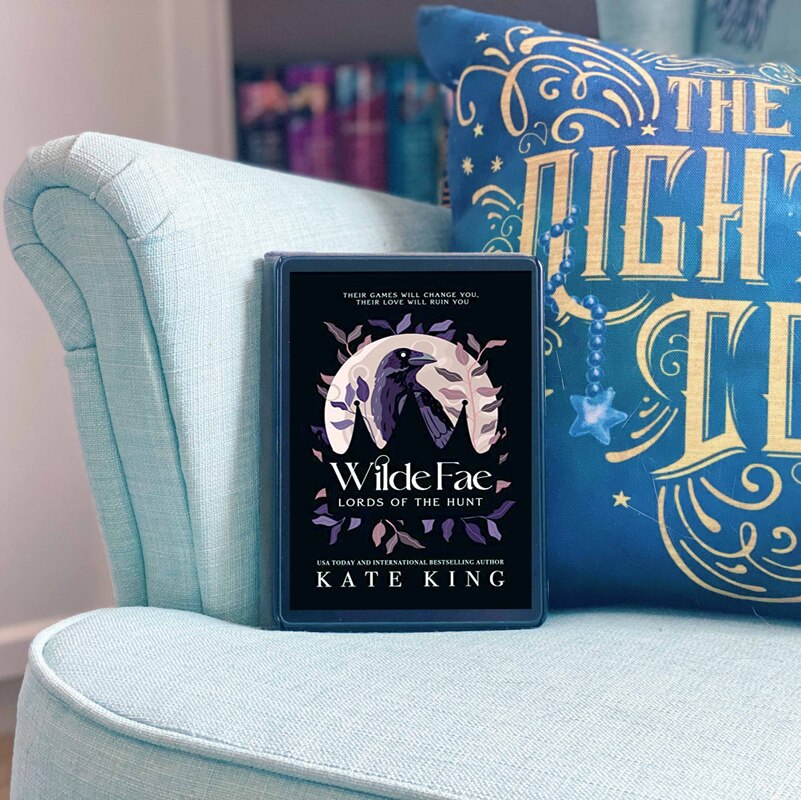
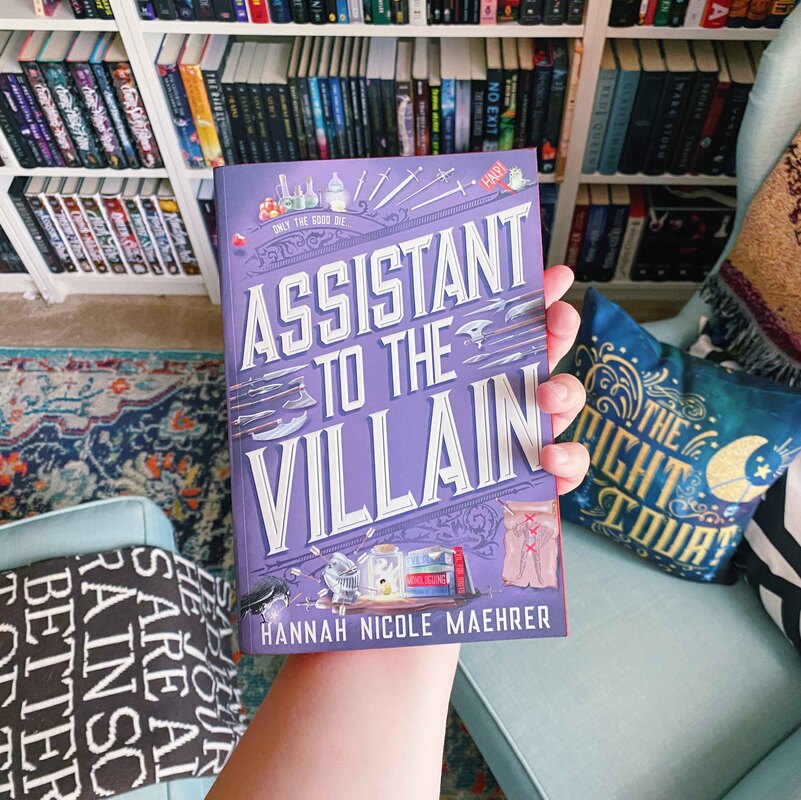
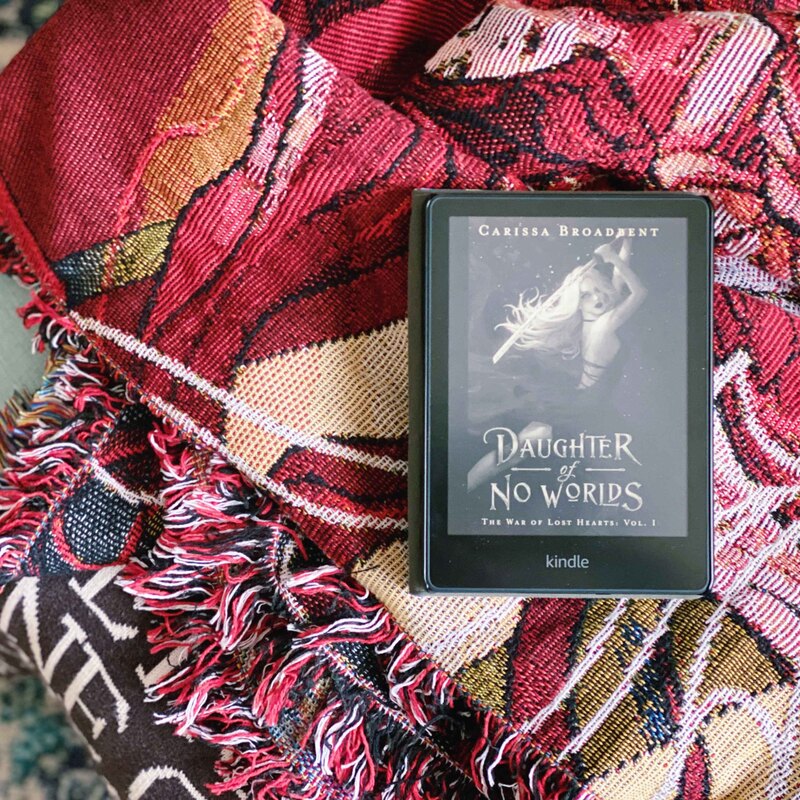
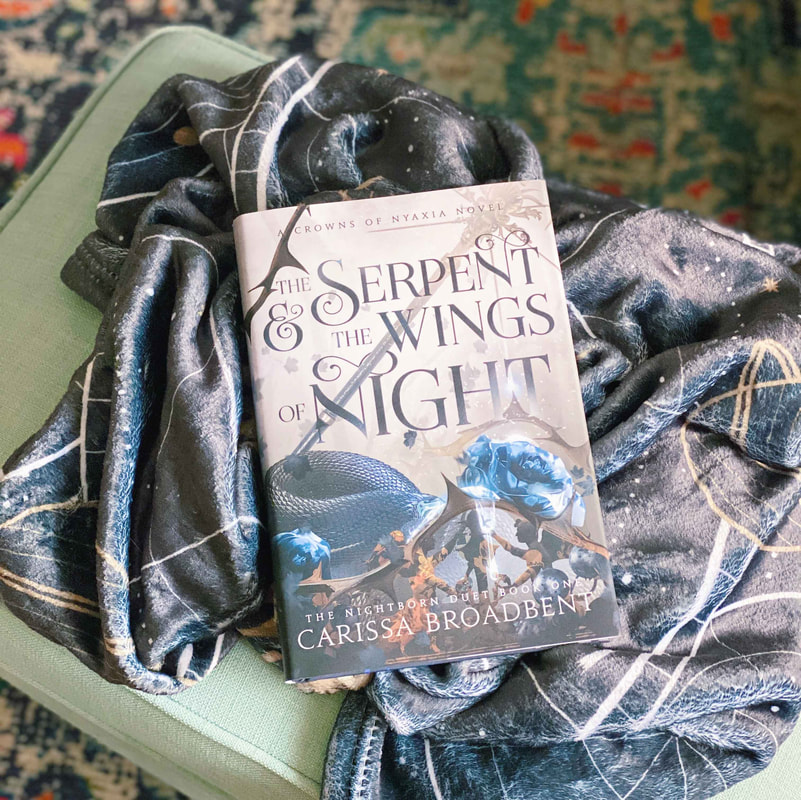
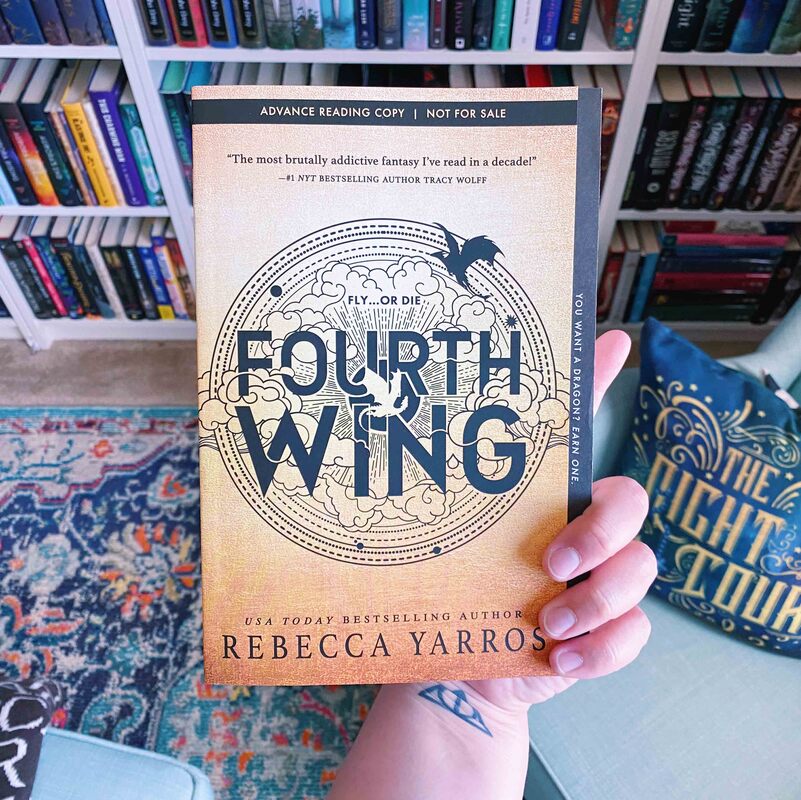
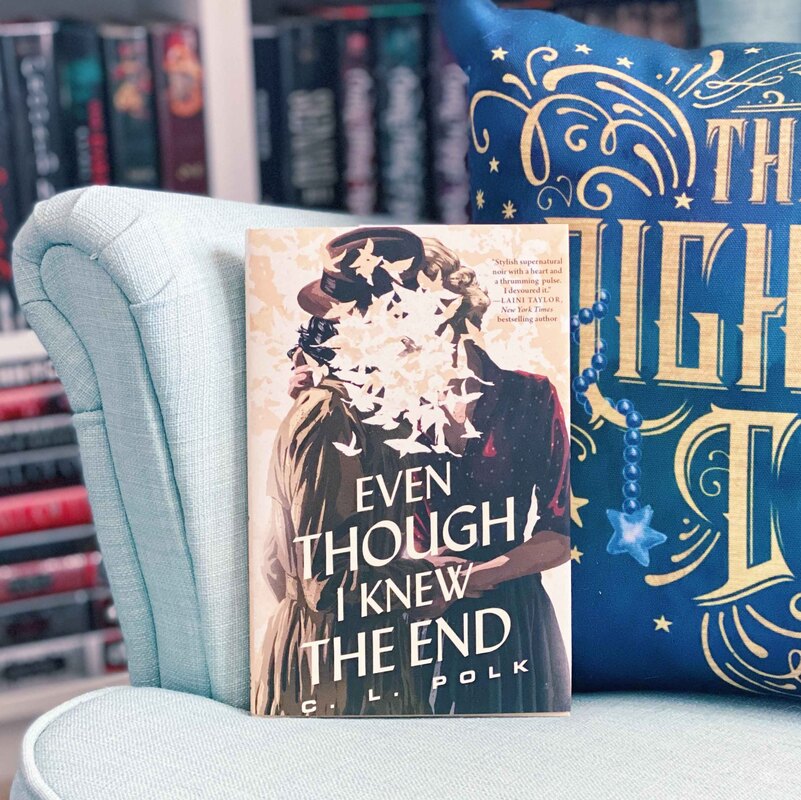
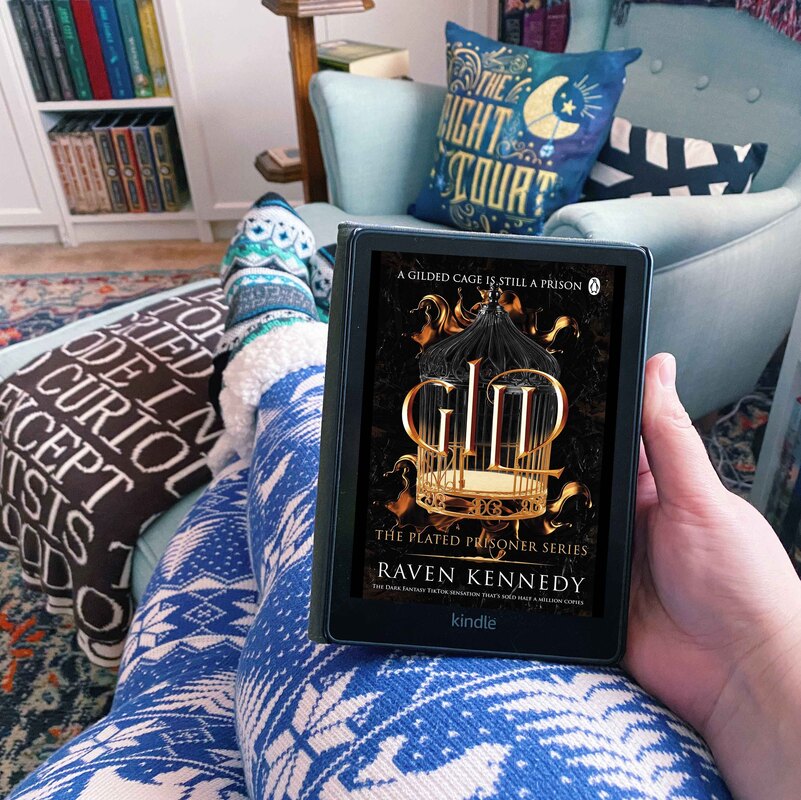

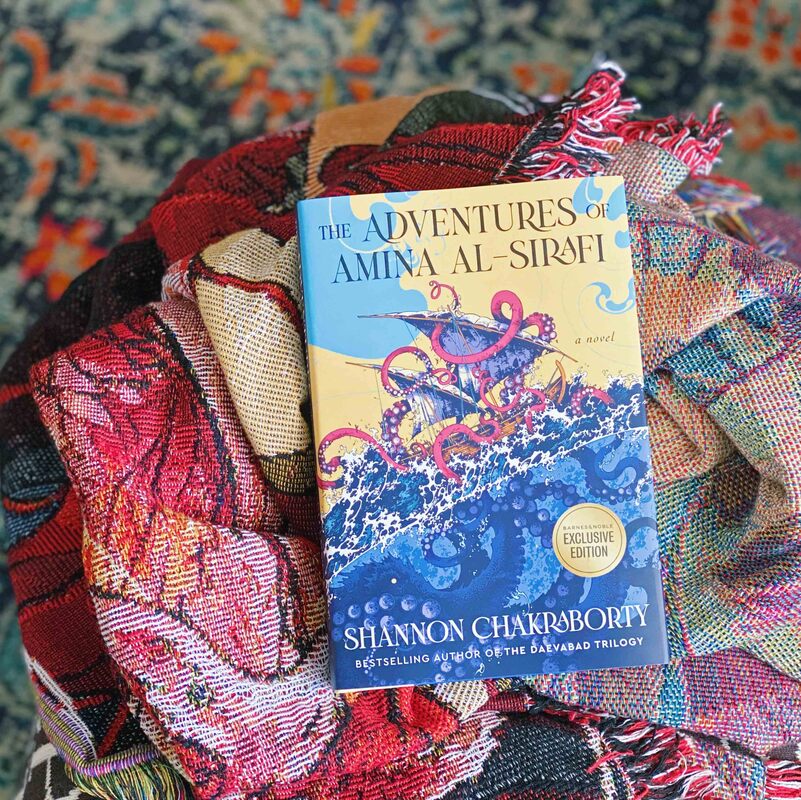

 RSS Feed
RSS Feed
